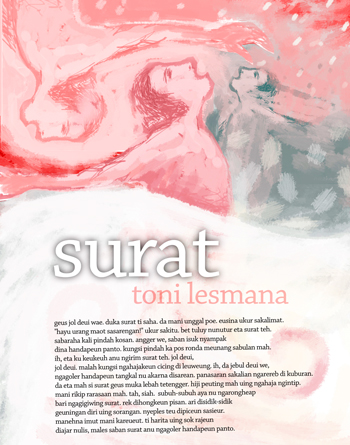Iip D. Yahya
A Sundanese mini-fiction illustrated by Nazaruddin AzharIip Yahya |
The message that greets visitors to the ‘Sundanese Mini-Fictions’ website is ‘Let us revitalise our sense of Sunda!’ This slogan is attracting many Sundanese writers to submit contributions for posting on the site. The participation rate is very high: between the time of its launch in September 2011 and May of 2012, the site posted no less than 18,638 stories, read by 2716 members, who had responded with 206,868 comments and 288,103 signs of approval in the form of the ‘thumbs up’ icon. It appears that technology is generating renewed interest in writing and reading Sundanese.
Sundanese mini-fictions
The Sundanese Mini-Fictions website was launched by the writer, broadcaster and journalist Nazaruddin Azhar on 16 September 2011. He was later joined by the writer and IT specialist Dadan Sutisna. Then came Godi Suwarna, a senior writer of prose and poetry in Sundanese. Because of the volume of contributions, two more administrators have recently commenced work. Inspired by the mini-fiction literature revival in Latin America, and following similar initiatives already underway in Indonesia, the site is a contemporary response to the surge of interest in Sundanese language and literature that accompanied the decentralisation policies of the early New Order period.
Many people have been surprised by the interest the site has attracted. Many posters are not just interested in literature, but also the Sundanese language: they use the site to expand their knowledge of their mother tongue, and express their pleasure in learning new expressions and widening their vocabularies. But apart from that, the site is giving expression to a sense of social and political change. The Sundanese language used on the site is moving away from the traditionalism and nostalgia that have encumbered it since independence, and towards a more egalitarian medium in which people participate with feelings of pleasure rather than inhibition.
The mini-fictions project uses the Facebook social networking site. After a mini-fiction is sent to the site, it is subjected to a ‘filtering process’ to ensure that it is a genuine submission. Works considered to be of very low quality are returned to the writer for further development. There are no tight and binding rules about making contributions to the site, except that all postings must be fiction, and stories should be less than 150 words in length. Once a mini-fiction has been posted, readers can send responses. In most cases, these appear minutes after a story is posted, most commonly in the form of a raised thumb indicating approval. If readers find the story interesting, exchanges of comments between members sometimes turn into discussions of linguistic, literary, social, political, and educational issues.
On one hand, the requirement of brevity makes participation attractive for many aspiring writers. Even novices are not scared of revealing too many shortcomings in just one hundred words or so. And the administrators have been surprised at the linguistic wealth of the contributions from writers from all walks of life: Godi and the other managers of the site are constantly meeting Sundanese expressions and lexical items of which they were previously unaware. On the other hand, writing quality fiction of this length is often harder than it sounds. The imaginative skills of the writer are the same as those needed to write short stories or novels, and there is greater pressure to squeeze ideas into expressions that make economical use of language.
There are only two requirements to join the group: competence in Sundanese and the ability to use online social networking media. Many group members use their smartphones to contribute, send responses and give their ‘thumbs-up’ while they go about their everyday lives. This technological component of the project is significant, because it frees the mini-fiction phenomenon from the input of older, established writers who are in general technologically illiterate. Some senior writers are not even familiar with a computer, let alone social networking media. From this perspective, the site may be heralding a ‘silent revolution’ in Sundanese literature. It is as though the senior writers who have constantly dominated Sundanese literary activity have been ‘removed’ from the scene by the intervention of technology.
 |
The mini-fictions site has succeeded because of the complimentary talents of its administratorsDadan Sutisna |
Administering change
The three original administrators brought unique skill sets to the group. As a broadcaster and a journalist, Nazaruddin serves as public relations officer, inviting users to join the group. He also acts as the gatekeeper who filters out contributions that are frivolous or of poor quality. He regularly reads mini-fictions from the site to listeners of the radio programs he broadcasts from Tasikmalaya, in the heart of West Java.
Dadan Sutisna brings technical knowhow. His background includes the creation of an award-winning computer program for the use of Sundanese script. He is responsible for the initial publication of mini-fictions on the Facebook group (www.facebook.com/groups/fikminsunda/). After that, he moves them to www.fikminsunda.com, which serves as a documentary repository for the group. On both sites, readers can find statistical data on the number of works written by members, the number of comments given, and so on. Through his technical knowhow, Dadan is mobilising technology that is enabling the creation of a resource for Sundanese writing on a scale never seen before.
The ‘Godi factor’ is also very significant. Godi is a senior writer whose poetry, short stories and novels have earned him three Rancagé awards, the literary prize initiated by the prominent Sundanese writer and cultural commentator Ajip Rosidi. He has long been known as a writer who is interested in crossing generational barriers, and his house in Ciamis, in the southern part of West Java, is always open to junior writers wanting to sit and chat with him about Sundanese literature. He puts his literary sensibility to use by sharing comments and opinions with aspiring writers who contribute to the site. Under Godi’s direction, some members develop ‘specialisations’, writing repeatedly on one particular theme. And being a senior writer, Godi gives the site an important connection to the Sundanese writing establishment.
In response to the participation attracted by the site, other institutions in West Java have climbed on board. The rector of Bandung’s Padjadjaran University, Professor Ganjar Kurnia, has become a member of the group, and a number of his works have been positively received by the site’s followers. He also supported the first ‘mini-fictions congress’ at Padjadjaran University (UNPAD) in Bandung in November 2011. This event included a graphic display and writing competition. Another congress was held on the International Day of Mother Tongues, 21 February 2012.
Conventional media have also joined in. Two local newspapers, Galemedia (Bandung) and Kabar Priangan (Tasikmalaya) regularly publish selected works in their hard-copy editions. A selection of contributions will soon be published in book form, with printing expenses to be met by the mini-fiction contributors.
Technology and taboo
Sundanese literary activity has always tended to be dominated by elites, especially those in control of a small number of magazines. This has brought with it a general conservatism of literary style. Writing in Sundanese tends to project images of polite introverts reluctant to express their deeper emotions as they struggle to navigate social and religious taboos. The mini-fictions group offers something different. In place of polite introverts, it has given voice to those who are anxious to do away with social taboos of all kinds.
One example concerns attitudes to marriage. In the past, male writers have written freely in Sundanese and Indonesian on the theme of polygamy. Now, readers of Sundanese mini-fictions have been exposed to the work of female writers expressing favourable attitudes to polyandry, something that would be difficult to publish in the standard media of newspapers and magazines. For example, a recent mini-fiction by Endah Dinda Jenura brought great approval from group members: the story described a fictional professor presenting new scientific discoveries about the menstrual cycle that would enable women to avoid pregnancy and enjoy polyandry.
Despite the rebellious attitudes the site sometimes gives expression to, the tone of exchanges and comments between members is always polite and inclusive. Exchanges are often critical, but the site displays a high level of respectfulness and friendliness. This ethic of politeness has contributed to the high participation in the site, and so has the absence of the personal differences and rivalries that have long dogged the Sundanese (and Indonesian) literary world. In traditional publishing, reviews and decisions are made behind closed doors, with the author excluded from the process of evaluation. In the Sundanese mini-fictions site, the administrators do exclude work they consider to be of low quality, but they do not assume responsibility for the quality of the works posted. Everything is open to all, and this transparency has contributed to a broad sense of appreciation for the site.
Despite the processes of change represented by the mini-fictions site, some things remain the same: most stories posted on the site deal with the theme of romance. A recent posting entitled ‘The Episode of the Night Flower’ by the senior writer Hadi AKS is illustrative: a divorced man experiences complex internal reflections when he encounters his former spouse working as an entertainer in a nightclub. Fictions of this type, known as ‘pink stories’ by the group’s members, are usually the most enthusiastically received.
Nevertheless, the mini-fictions site is providing a space for expression that displays open-mindedness and social inclusion. It is critical, but it has not lost the sense of fun and humour that are so important for Sundanese audiences. In fact, the humour of the project is enhanced by its technical features: its accessibility enables posters to contribute mini-fictions and comments in their limited free time.
Some contributors see a political potential in the site. In the current Indonesian climate, they are more and more aware that Indonesian political and social life is still dominated by the established players. Political taboos and restraints on communication perpetuate outlooks that are obsolete and exclusive. There is a possibility, some argue, that the mini-fictions phenomenon will be a forum for the expression of alternatives to a status quo with which Sundanese are all too familiar.
Iip D. Yahya (iip_chapter@yahoo.com) is a freelance writer currently undertaking research at Monash University.{jcomments on}
Inside Indonesia 110: Oct-Dec 2012
